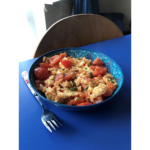How I Spent Less Money Abroad than at my Home Institution


As a low-income student, I was worried that studying abroad would break my bank. I believed going abroad not only meant I needed to spend tons of money on flights, housing, and food but also put a lot of effort into budgeting to prevent inordinate costs. My fear stopped me from even considering it a possibility to study overseas. However, as I heard stories of how studying abroad is a once-in-a-lifetime experience, I knew I could not pass up the opportunity to do so. Doing some investigation, I learned there are numerous options to mitigate the costs of studying abroad. By researching and planning my spending, I was able to keep my costs below what I would usually spend in a semester at my home university. If you have a socioeconomically disadvantaged background like me, you do not have to worry! Here are some tips that helped keep my study abroad trip at the University of Glasgow in Scotland during Fall 2019 at a reasonable budget.
Connect with your Study Abroad Office
Many universities will transfer your aid to your semester abroad. Many schools’ study abroad offices also have their own scholarships to apply to. In addition, some programs, like IFSA, also provide you with scholarship opportunities. Finally, different programs have different costs, which you can factor into while making a choice about where to study abroad. For me, my school transferred my financial aid for my semester abroad, and education fee at the University of Glasgow was cheaper than at my home institution. Furthermore, to incentivize students to go abroad in the Fall, my school provided students a $500 bonus for doing so. In the end, I found out I would spend less money going abroad than staying at my home university. Reaching out to my Study Abroad Office and finding this information helped obtain much of my savings for this trip.
Do Research

After you decide on a program and location, start researching the country before you arrive to get a better picture of the cost of living. What is their currency? How does it convert to US dollars? What is the average price of groceries and toiletries? I found out that Scottish pounds are roughly 1.2 US dollars, which helped me set a budget for my semester and have a better concept of a low and high price for certain items. Knowing this will come in handy for budgeting later. IFSA also provides a lot of this information on costs and currency during their pre-program orientation.
After you arrive, keep researching! I was able to find cheap restaurants and grocery store near my school by searching the Internet for cheap stores nearby. Further, many places give student discounts. At the University of Glasgow orientation, students were provided with student discounts cards at several of the restaurants and bars (the legal drinking age is 18 in Scotland). I was able to get up to 50% discounts at some restaurants because of this.
Budget, Budget, Budget

Keeping track of expenditures is the most important step. First, set a certain amount you aim to spend for each type of expense. For example, allocate a monthly target for food, toiletries, travel, academics, and events. Then record your expenses. You can use Excel to make numerical calculations easy. I wrote down all my expenses in the Notes app on my iPhone as soon as I made any purchase to make sure I didn’t forget by the time I had access to a computer or notebook. If you like writing by hand, IFSA provides a planner to record your expenses. Doing this made me aware of exactly how much I was spending and kept me accountable during times I did not hit my goals. Occasionally going over your budget is okay too, as long as you are aware and keep close to your target.
Take Advantage of Free Events
You would be surprised at how many free events there will be during your time abroad. These are typically offered by your University or study abroad program. For most programs, IFSA provides an orientation, homestay, and excursion. Often, IFSA will also cover a portion of the meals on each trip. This is an amazing opportunity to take advantage of, because you can explore the country without having to pay the cost and bond with your fellow IFSA peers! Furthermore, IFSA usually provides events throughout the semester, such as walking tours and get-together meals, which are usually at no cost.

Your university may also provide free or significantly discounted events for its students. The Adam Smith Business School at University of Glasgow provided us with several free events to attend, such as a Halloween Ball and a Wine and Cheese Night. At the ball, we were given a free 3-course meal, drinks, and a beautiful venue with a dance floor, which in my opinion is a pretty good deal!
In Glasgow, you can also enjoy many free parks, attractions, and museums. The Kelvingrove Museum and Botanic Gardens are great places you can spend with friends and not spend a dime. Although these places are in Glasgow, these free attractions exist in nearly every city.
Make Sure to Have Fun
Although budgeting and saving money is important, it is more important to enjoy your abroad experience. For me, this meant to occasionally splurge on nice restaurants, take a trip to another country, or invest in a rare experience. But even if you do splurge, there are ways to save money as you do so. If you decide to take a trip, plan beforehand! Search up cheap flights in incognito mode (sometimes the prices will go up if you search normally) and book an Airbnb ahead of time. If you travel with a friend, you can split the fees. Easy Jet Airlines is a cheap option for European flights, or if you are traveling within one continent, the train is another cheap transportation option. I gave myself a splurge opportunity once a month and was able to travel to London, go to a whiskey and chocolate tasting, and treat myself to a steak dinner at one of the nicest restaurants in Glasgow.
At the end of my semester abroad, I felt that I had experienced everything I wanted to and was also able to do so at a reasonable cost. Hopefully, my experiences and tips can palliate your fears about studying abroad as a low-income student. Let me be the example that you can go abroad, enjoy your time, and be able to afford it!
Eryn Lin is a Economics major at Vanderbilt University and studied abroad with IFSA at the University of Glasgow in Fall 2019.